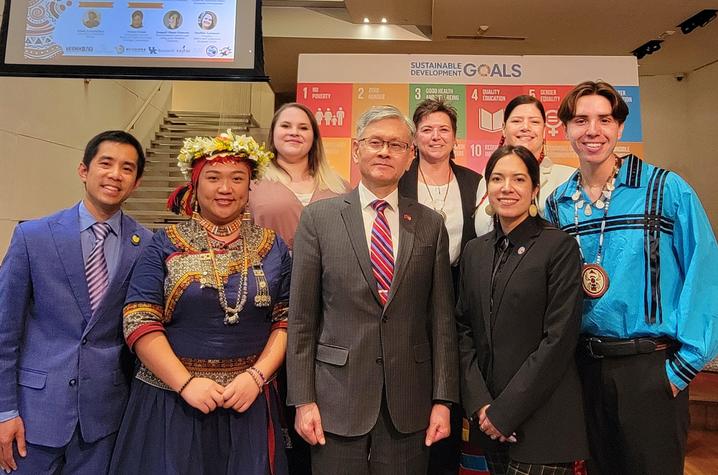
LEXINGTON, Ky. (June 3, 2024) — Last month, the University of Kentucky had significant involvement in this year’s Seminar on Indigenous Issues, held April 24 in New York City, as part of the United Nations Permanent Forum on Indigenous Issues.
The seminar, organized by Edward Lo, Ph.D. (羅力明), a Lyman T. Johnson Postdoctoral Fellow in the Appalachian Studies Program at UK’s Appalachian Center, focused on Indigenous self-determination and brought perspectives from Kentucky to an international stage.
Lo collaborated with Ann Kingsolver, Ph.D., professor of anthropology and director of the Appalachian Studies Program, and Kathryn Engle, Ph.D., director of the Appalachian Center, to develop the seminar. Their ongoing research at UK aims to integrate Indigenous knowledge and perspectives into broader academic and policy discussions, particularly concerning environmental sustainability and land management.
“This was my first time organizing a U.N. side event, and I am so proud of the panelists for trusting me in this process,” Lo said. “My goal is to elevate the knowledge and practices that Native Americans contribute to sustainable land and water stewardship, including from tribal nations with ancestral land in Kentucky such as the Cherokee people. Our understanding of, and response to, floods and environmental change in the Commonwealth is enhanced by Traditional Ecological Knowledge.”
Joining Lo were panelists Venus Evans (Mi’kmaq Nation), commissioner-at-large for the Kentucky Native American Heritage Commission, and May 2024 UK graduate Shelbie (ᏩᎴᎳ) Larmour (Cherokee Nation of Oklahoma). Evans and Larmour are both lifelong Kentuckians and Appalachian Native Americans.
Emerald Skye Byrd (Coushatta Tribe of Louisiana), business development director for the National Center For American Indian Enterprise Development, and Anagali Shace Duncan (United Keetoowah Band of Cherokee Indians in Oklahoma), a Native American studies major at Stanford University, represented Indigenous activism and interests from across the country.
Larmour, who graduated this May with a degree in communication and a minor in Appalachian studies, plans to study law with a commitment to understanding and advocating Indigenous rights and sovereignty.
“This journey was not solely about sharing perspectives; it was about forging bonds, cultivating understanding, and fostering solidarity among diverse communities united in a common cause,” Larmour said. “Each encounter, each exchange, became a thread woven into the fabric of collective empowerment and resilience. As I reflect on the impact of our collective efforts, I am filled with hope — hope for the present and hope for the future. For it is the strength and determination of individuals like those I met in New York, and the countless others fighting tirelessly for justice and equity, that instill within me a profound sense of optimism for the next seven generations.”
Byrd also recognized the significance of the event.
"Participating in this seminar has reaffirmed the power of our collective voices and the importance of Indigenous knowledge in shaping a sustainable future,” she said. “It's inspiring to see our traditions and perspectives recognized on an international stage."
The seminar covered such topics as the definitions of self-determination, solidarity in global and regional contexts, resistance to displacement and intergenerational contributions to sovereignty.
Lo said a sustainable future for Kentucky, amid increasing environmental change, requires understanding and acknowledging the value of Native American perspectives.
“These perspectives often prioritize balancing consumption and conservation, which is essential for effective land and water management,” he said. “Broader awareness of the impact of Indigenous people in Kentucky, both historically and presently, is vital for the adoption of Indigenous-informed policies.”
Lo's initiative was supported by the Taipei Economic and Cultural Office in New York, UK Research and the UK Appalachian Center and Appalachian Studies Program.
A full recording of the seminar, courtesy of the host Taiwan in New York, can be watched here.
As the state’s flagship, land-grant institution, the University of Kentucky exists to advance the Commonwealth. We do that by preparing the next generation of leaders — placing students at the heart of everything we do — and transforming the lives of Kentuckians through education, research and creative work, service and health care. We pride ourselves on being a catalyst for breakthroughs and a force for healing, a place where ingenuity unfolds. It's all made possible by our people — visionaries, disruptors and pioneers — who make up 200 academic programs, a $476.5 million research and development enterprise and a world-class medical center, all on one campus.
In 2022, UK was ranked by Forbes as one of the “Best Employers for New Grads” and named a “Diversity Champion” by INSIGHT into Diversity, a testament to our commitment to advance Kentucky and create a community of belonging for everyone. While our mission looks different in many ways than it did in 1865, the vision of service to our Commonwealth and the world remains the same. We are the University for Kentucky.
